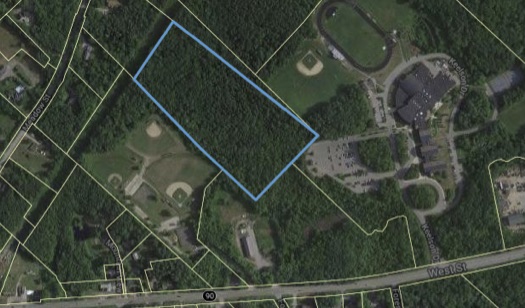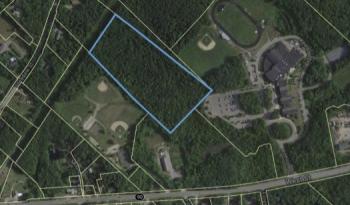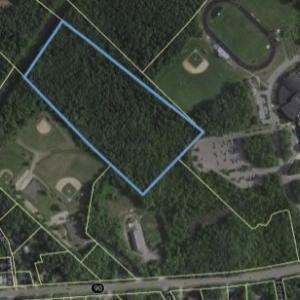Five Town School Board votes 7 to 1 to shape a solar farm contract agreement
CAMDEN — The Five Town CSD School Board, which governs Camden Hills Regional High School, voted 7 to 1 at a special meeting July 29 to pursue a contract with ReVision Energy, of Liberty, to construct a 1.5 to 1.8 megawatt solar farm on a portion of land owned by the CSD on Route 90 in Rockport.
The Five Town CSD comprises Appleton, Camden, Hope, Lincolnville and Rockport, whose taxpayers fund the public high school.
ReVision Energy and investment group Aligned Climate Capital LLC would be the private investors, as well as construction and installation crew, while the CSD would lease the land for the project. (Read Private entities pitch building 2,000,000 kWh solar farm on Camden Hills Regional High School campus for the proposal that was to be discussed.)
Five Town CSD Superintendent Maria Libby reported July 30 that the vote was 7 to 1, with board member Pete Orne, of Camden, opposing the measure. Orne raised a series of questions, which are stated below in entirety.
“There was a vote to give me the authority to move forward with a PPA and land lease agreement to build a solar farm on the property owned by the Five Town CSD,” said Libby.
The principals include ReVision Energy and the investor group, Aligned Climate Capital, with collaboration from Coastal Enterprises Inc., which are to provide approximately $3 million in financing to sell solar energy to the district for 9 to 10 cents per kilowatt-hour.
According to a summary included in the board pre-meeting packet, the recently signed LD 1711, An Act To Promote Solar Energy Projects and Distributed Generation Resources in Maine, “has created a favorable market opportunity for the CSD.”
The five towns collectively own the high school and land it sits on.
A ReVision memo said the district could save approximately $60,000 a year, with zero capital investment costs, as all site preparation and installation costs are to be born by Aligned Climate Capital.
Aligned would own, operate, and maintain the solar farm, selling solar electricity to the district under an electricity procurement contract.
Construction of the solar project, along with management of both the negotiation with Aligned and the monitoring of the solar project, is to be provided by ReVision Energy.
If the project is completed before the end of 2019, Aligned would achieve a current year tax credit, “allowing them to offer the lowest possible price structure to the District,” the memo said.
If the project is completed at any time after December 1 2019, the project is eligible for LD 1711 rates, it said.
“If the District can move forward with some urgency in making this electricity commodity procurement, it can achieve its maximum savings both in the first year and in every year of the 25 year contract,” according to ReVision. “The District will also have the opportunity of negotiating an option to purchase the solar project from Aligned, at some future date.”
Libby said July 31 that negotiations have yet to begin.
“Our next steps will be to work out all the details,” she said.
Orne, in reply to the question why he voted against the motion to pursue negotiating a power purchase agreement with Revision Energy, said July 30:
“While I am in favor of renewable energy, and solar in particular, I was uncomfortable with the urgency and the amount of information available prior to the Board meeting to make a properly informed decision,” wrote Orne, in an email.
“The urgency, as I understood from the distributed summary material, stemmed from the need to start this project by October 1st and complete it between December 1st and December 31st, 2019 in order to qualify for LD 1711 (after Dec 1) and maximize the federal tax credit for the investor (changes from 30% to 26% on January 1st, 2020 as I read the sales sheet).
“What I wondered aloud was would improvements in solar construction (cost and efficiency) offset the potential loss to the investor of 4% tax credit. And, Revision required a Board vote authorizing the negotiation of the PPA prior to even starting.
“We have 60 days to start the project and another 90 days to finish it. Again, I was uncomfortable with the urgency and uncertain of the actual cost, or savings, of waiting. The list of action items presented in the summary, especially ones referencing MDOT, MDEP, CMP, and permitting are very concerning as I don't know how these organizations work.
“Negotiating the best agreement for the Five Town CSD with Revision and with Aligned Climate Capital, in order to start, this project seems rushed given that we don’t know what the cost of electricity generation from the solar field will actually be, what the rate we will pay in a PPA, and what the cost of the actual construction project by Revision will be (which affects the negotiated rate).
“We don’t know whether the project was going to be $3 million or $3.5 million. We didn’t know if it would be 1.5 million kWh or 2.0 million kWh project. We didn’t know the rate we would pay which would are affected by cost of project, finish date, profit margins, and investors required rates of return.
“I questioned not having a plan for the savings. I mentioned that the $60,000 in savings might actually be leveraged for up to $1 million of other energy efficiency upgrade projects to the High School (which is now almost 20 years old) that might generate even more long-term savings, both financial and environmental.
“I questioned who the players are. Revision is a solar construction company who will benefit from the initial project.
Aligned Climate Capital will benefit from the tax credits of up to 50% of the project cost, in the first year from the federal tax credit and the accelerated depreciation of the project cost, if I understood Revision correctly.
I wondered allowed if after the tax credit is fully used up in 3-5 years, would the cash flow portion of the project (the difference between the CSD negotiated price and the cost of generation) be sold to another investor, and at what rate of return, as happens in other projects like this.
“I wondered aloud, who would be responsible for the ‘unprecedented educational experiences,’ and what that might look like, mentioned in the Revision Board Summary and also brought up at the meeting. This has a cost, real and/or opportunity.
“Like I said in the meeting, I am in favor of projects like this. I just did not have the information I needed to vote for the project last night and I didn't think that even if every question I had was answered that I still would have wanted to verify.
“That said, I’m also confident that our superintendent will seek out the best information and professionals to address my concerns and strike a fair deal for the CSD. I trust the decision of the Board and fully support its decision. This was a very thoughtful discussion and I admire the commitment of the Administration to explore and use alternative and renewable energy.”
Event Date
Address
United States





























